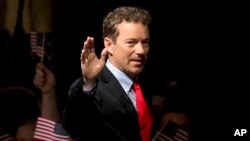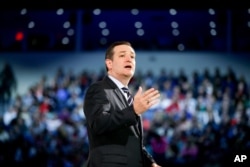Kentucky Senator Rand Paul entered the presidential race this week, ensuring a lively debate in the Republican primaries over foreign policy. Paul has long charted his own course on foreign affairs.
Early on, he supported negotiations with Iran over its nuclear ambitions and was one of the few Republican voices to question long-term military engagements overseas.
In his campaign announcement in Louisville, Kentucky, Paul sought to strike a balance between a strong national defense in the age of terrorism without lengthy commitments of U.S. troops in overseas war zones.
"I envision an America with a national defense unparalleled, undefeatable and unencumbered by overseas nation-building," said Paul. He added that conservatives "should not succumb" to the notion that "a government inept at home will somehow succeed in building nations abroad."
Paul has been on the defensive since his announcement that some of his foreign policy views have changed, including a notably combative interview with NBC’s "Today" program.
Paul also has come under attack by conservatives, including one group called the Foundation for a Secure and Prosperous America, who see him as too soft on foreign policy.
In recent months, Paul has modified his views somewhat. He now supports military action against the Islamic State group, and he said in his announcement speech "the enemy is radical Islam. You can’t get around it."
Paul said if elected next year, he would "do whatever it takes to defend America from these haters of mankind."
Despite his previous statements supportive of negotiations with Iran, Paul was one of 47 Republican senators to sign a letter to Iran’s leaders warning that any deal they reach with the Obama administration on its nuclear program could easily be undone by a future U.S. president. He also said any nuclear deal between Iran and the U.S. must be approved by Congress.
Defining issue in primaries
Paul became the second Republican to officially enter the race after Texas Senator Ted Cruz, who has seen a surge in several national polls since his campaign launch last month.
Florida Senator Marco Rubio is slated to become the third official Republican contender on Monday.
Both Cruz and Rubio are expected to highlight a conservative approach on foreign policy sharply critical of the Obama administration’s record and more confrontational with regard to the challenges posed by the Islamic State and Iran.
"Imagine a president who says, 'I will honor the Constitution and under no circumstances will Iran be allowed to acquire a nuclear weapon,'" said Cruz in his announcement speech last month in Lynchburg, Virginia.
Republicans expect a large field of 2016 contenders to formally join the race over the next several months and many of them believe foreign policy will be a major factor in next year’s election.
Among those considering a White House run is former United Nations Ambassador John Bolton. He said he has been watching what he views as a shift in public concern about foreign policy issues.
"I think that was evident to some extent in our last congressional elections in November of last year, and I think the evidence is building it will be far larger in the 2016 election," said Bolton.
Bolton said he will decide in the next few months.
Factor in Republican primaries
Conservative activists shopping for a Republican presidential candidate are paying more attention to their foreign policy views in this election cycle.
"We all know that there is a building keg in about four different regions of the world today. We are just waiting for someone to light that match," said Scottie Nell Hughes, news director of the Tea Party News Network.
"We are hoping we have somebody as commander in chief who knows how to handle it when it does explode," she said.
Hughes spoke at the recent Conservative Political Action Conference in Maryland, where there was a greater focus on foreign policy issues than in past years.
Of course, not everyone is convinced that foreign policy will be a deciding issue in next year’s campaign.
"Other than the economy, which is always the major issue, there are no other big issues out there," said Quinnipiac pollster Peter Brown. "Obviously, there is some concern over foreign policy. And with the economy improving, it becomes less of an issue. But it is still the big issue."
If foreign policy does become a major issue, however, Democrats believe they have a trump card up their sleeve by the name of Hillary Clinton.
The former secretary of state is expected to launch her presidential campaign soon, and she no doubt will highlight her achievements at the State Department under President Barack Obama as a key reason why she should ascend to the Oval Office in January of 2017.






